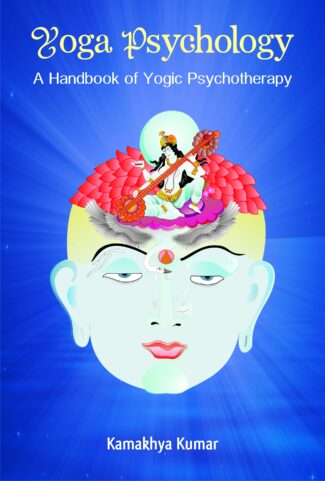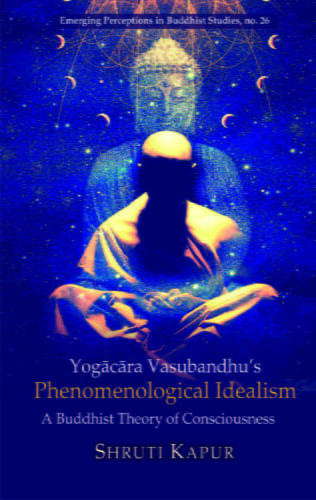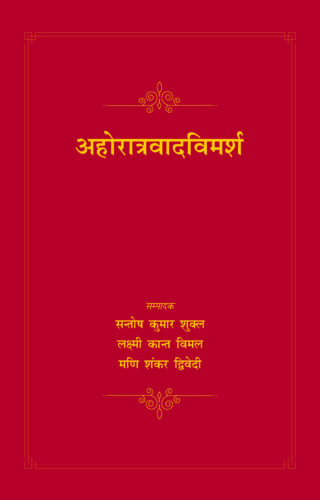Showing 251–256 of 256 results

It is an authentic edition and consistent documentation of the complete philosophical journey of Shri Yashdeva Shalya. It provides a penetrating philosophical reflection on the self-conscious act of self-conscious being engaged in the cultivation of culture and civilization through different modes of creativity.
Yashdeva Shalya Samagra is an authentic edition and consistent documentation of the complete philosophical journey of Shri Yashdeva Shalya. It is Yashdeva Shalya who can be considered as one of the most original thinkers of twentieth-century India, after the advent of Sri Aurobindo. The philosophical contributions of Yashdeva Shalya have taken the shape of a complete system of philosophy during his active engagement with the East and West history of ideas for the last five decades. It is widely known as the philosophy of Chidadvaitavada which truly depicts the metaphysics of human creativity. For Yashdeva Shalya, all modes of human creativity vis-à-vis philosophy, religion, history, culture, literature, ethics, aesthetics and scientific temper are nothing but an unending quest of self-conscious being in the direction of getting rid of its self-alienation. Thus, four volumes of Yashdeva Shalya Samagra, i. e. Jnana aur Sat, Cit aur Mulya, Samaj aur Sanskriti and Darshnik Itihas-Dristi provide a penetrating philosophical reflection on the self-conscious act of self-conscious being engaged in the cultivation of culture and civilization through different modes of creativity. The collection of these four volumes will be certainly a valuable asset for the library of any institution and for sincere knowledge seekers.

The sound practice of yoga enables one to have a disease-free body and keen intellect. This book details the impact of various yoga practices on psychology and specifies that consciousness has a wider conation in yoga in developing one’s personality traits and leveraging them further to keep him/her happy and experience a blissful life.
Yoga psychology is both a positive and a normative science. It not only analyses human personality and its growth, but sets normative ideals and prescribes techniques to achieve such objectives, as well. Thus, expansion of consciousness and making oneself the master of his/her mind are the broad objectives of yoga psychology. The topological aspect of mind as described by Freud in terms of conscious, subconscious and unconscious levels was well detailed in the yogic literature, thousands of years ago. The sound practice of yoga enables one to have a disease-free body and keen intellect.
The book, thus, details the impact of various yoga practices on psychology and specifies that consciousness has a wider conation in yoga. Yoga presents vivid and sound meditation procedures for the attainment of psychic consciousness through the awakening of kundalini. Homeostasis or balance is the central principle in yoga psychology, and it holds that any sort of imbalance in the system physical, psychological or pranic creates disorders and the solution lies in rebalancing it. Here comes the role of yogic psychotherapies such as prarthana, mantra sadhana, spiritual couselling, pranayama, yajna, sankirtana, svadhyaya and vrata anushthana.
This volume enunciates that yoga psychology is an applied science, and thus has remedies for many individual and social problems. It deals at large with the application and benefits of yogic practices in developing ones personality traits and leveraging them further to keep him/her happy and experience a blissful life.

This book is a comparative study of the phenomenology of Yogacara Vasubandhu and that of the German philosopher Edmund Husserl having the focus on the understanding of the deeply inner nature of consciousness or mind. It asserts that the Yogacara philosophy is much richer and comprehensive than the Western phenomenology, particularly the Husserlian phenomenology.
This book is a comparative study of the phenomenology of Yogacara Vasubandhu and that of the German philosopher Edmund Husserl having the focus on the understanding of the deeply inner nature of consciousness or mind. It articulates that the Yogacara philosophy is much richer and comprehensive than the Western phenomenology, particularly the Husserlian phenomenology.
Later Vasubandhu’s philosophical orientation was idealist in Indian sense or a phenomenologist in Husserlian sense. His Mahayana Yogacara idealism is based on Asanga’s seminal text Sandhinirmocanasutra and his own Vijnaptimatratasiddhi (Vimsatika and Trimsika together) along with his exploration of the intrinsic theory of consciousness or mind. For one to have a clear-cut understanding of Vasubandhu, the book follows the Husserlian phenomenological approach as a philosophical methodology and also used select terminology wherever required.
This book is expected to be highly useful for students, researchers and teachers in the area of Indian/Buddhist philosophy.
This book is a comparative study of the phenomenology of Yogacara Vasubandhu and that of the German philosopher Edmund Husserl having the focus on the understanding of the deeply inner nature of consciousness or mind. It asserts that the Yogacara philosophy is much richer and comprehensive than the Western phenomenology, particularly the Husserlian phenomenology.

This book is a journey in search of these mysterious figures who nestle in the shadow of the Goddess. A journey which unfolds in the frontier zones of Indian tradition, constantly hanging in the balance between Tantric rituals, sacrifices and subtle knowledge.
The Yoginis are awful expressions of the divine in feminine form of which evidence is found in Tantric contexts in both the Hindu and Vajrayana Buddhist traditions. Endowed with a multitude of aspects and functions, they may take the form of women or witches devoted to obscure rituals, of primordial forces linked with illness, poisoning and possession, of subtle beings present in supporting one for meditation like yantra and mantra, or of genuine gods who frighten and fascinate. Gathering in circles in the depths of the forest or in cremation grounds, the Yoginis engender powers and secret knowledge, granted to those who evoke them through practices which may be extreme. Ultimately the Yoginis keep company with death, offering to the initiates who surrender to their embrace the prospect of liberation beyond the glittering world of illusion.
This book is a journey in search of these mysterious figures who nestle in the shadow of the Goddess. A journey which unfolds in the frontier zones of Indian tradition, constantly hanging in the balance between Tantric rituals, sacrifices and subtle knowledge a perilous quest which is the heritage of all traditional searches.
This volume written in elegant, fluent and colourful prose should entice the interest of all those associated with the Tantric practices, especially that of Saptamatrikas, ten Mahavidyas, Dakini and Nitya.

पं˚ मधुसूदन ओझा द्वारा प्रणीत सृष्टि प्रतिपादक अहोरावाद नामक ग्रन्थ का इस पुस्तक में विमर्श प्रस्तुत किया गया है। जिसमें अहोरावाद के विविध विषयों को आधार बनाकर आमिन् त विद्वानों द्वारा लिखे गये विमर्शात्मक शोधपत्रों का संकलन तथा अहोरात्रवाद ग्रन्थ की मूल प्रतिलिपि को समाहित किया गया है।
“अहोरात्र शब्द अहः एवं राि इन दो शब्दों से मिलकर बना है। ‘अहः च रािः च’ ऐसा विग्रह द्वारा द्वन्द्व समास होकर ‘अहोरा’ शब्द निष्पन्न होता है। सृष्टि की उत्पत्ति विषयक अनेक सिद्धान्त आचार्यों द्वारा दिये गये हैं। उन सिद्धान्तों में से सृष्टि सम्बन्धी अहोराविषयक सिद्धान्त अहोरावाद के नाम से जाना जाता है। ऋग्वेद के “नासदीय सूक्त” में सृष्टिविषयक अन्य सिद्धान्तों के साथ अहोरावाद का भी उल्लेख मिलता है। ऋग्वेद के अघमर्षण सूक्त (१०.१९०.३) में कहा गया है कि निमेष मा में ही जगत् को वश में करने वाले परमपिता ने दिन और रात का विधान किया। श्रीमद्भगवद्गीता (८.१७) के अनुसार ब्रह्मा का जो एक दिन है, उसको एक हजार चतुर्युग तक की अवधिवाला और राि को भी एक हजार चतुर्युग तक की अवधि के रूप में जो जानते हैं, वे योगीजन काल के तत्त्व को जानने वाले हैं। बृहदारण्यकोपनिषद् में भी सृष्टि प्रक्रिया के प्रसंग में अहोरा शब्द का अनेक प्रयोग मिलता है। इस उपनिषद् के प्रारम्भ में यज्ञसम्बन्धी अश्व को आधार बना कर उसके अवयव का वर्णन किया गया है। तदनुसार उस यज्ञीय अश्व के सामने महिमारूप से दिन प्रकट हुआ। राि इसके पीछे महिमा रूप से प्रकट हुई। विद्यावाचस्पति पं˚ मधुसूदन ओझा ने सृष्टिविषयक अहोरावाद मत के विषय में विविध वैदिक सन्दर्भों का आलोकन कर अहोरावाद नामक ग्रन्थ का प्रणयन किया है। यह ग्रन्थ कुल १२ अधिकाराें में विभक्त है। प्रतिज्ञा एवं उपसंहार को छोड़कर इस ग्रन्थ के १० अधिकाराें में ज्ञान-अज्ञान, शुक्ल-कृष्ण, प्रकाश-अन्धकार, भाव-अभाव, सृष्टि-प्रलय, द्यावा-पृथिवी, ऋत-सत्य, सप्ताह, यज्ञ और चातुर्हो ये दस विषय वर्णित हैं। अहोरावादविमर्श नामक इस ग्रन्थ में विद्यावाचस्पति पं˚ मधुसूदन ओझाजी के द्वारा प्रणीत सृष्टि प्रतिपादक अहोरावाद नामक ग्रन्थ का विमर्श प्रस्तुत किया गया है। जिसमें अहोरावाद के विविध विषयों को आधार बनाकर आमिन् त विद्वानों के द्वारा लिखे गये विमर्शात्मक शोधपत्रों का संकलन तथा अहोरात्रवाद ग्रन्थ की मूल प्रतिलिपि को कारिकानुक्रमणिका एवं शब्दानुक्रमणिका के साथ समाहित किया गया है।”
दार्शनिक समीक्षा का सत्याग्रह नामधेय यह कृति मेरे द्वारा दिए गए व्याख्यानों का एक परिमार्जित संग्रह है। यह सभी व्याख्यान भारत के प्रतिष्ठित शिक्षा संस्थानों में 2017-18 के दौरान भारतीय दार्शनिक अनुसन्धान परिषद् के अतिथि आचार्य (विजटिंग प्रोफेसर) के रूप में दिए गए थे। ऐसे संग्रह-ग्रन्थ में विचार केन्द्रित अन्विति नहीं होती, और यदि होती भी है तो उसे विचारक-केन्द्रित अन्विति के रूप में ही परखा जा सकता है। विचारों में विचारक-केन्द्रित अन्विति अनुप्रास युक्त पदों से निर्मित एक वाक्य की तरह होती है जिसके अलग-अलग पद आनुप्रासिक सौन्दर्य के साथ अर्थ का अभिधान करते हैं। इसी प्रकार का आनुप्रासिक सौन्दर्य एक व्यक्ति के बहुविध वैचारिक उपक्रमों की सार्थकता होती है। दार्शनिक समीक्षा के रूप में समाकलित इन सभी व्याख्यानों की अन्विति उनके सत्याग्रही होने में है। विचार का सत्य विचारों के मूलगामी अर्थ को उद्घाटित करना है। समीक्षा जब इस उद्देश्य के साथ प्रवर्तित होती है तभी “सत्याग्रह” उसका विशेषण बनता है।
| There are no products |